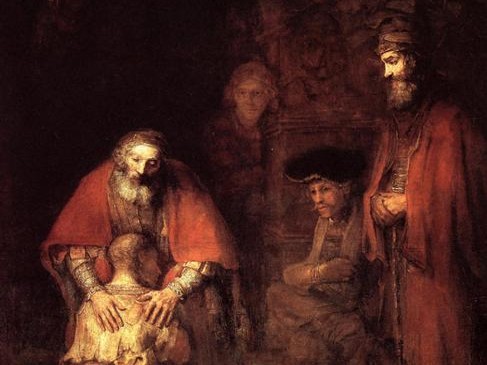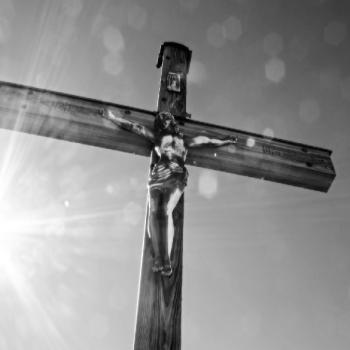Jesus was the greatest storyteller the world has ever known, and the parable traditionally known as “The Prodigal Son” is, perhaps, his masterpiece. Every detail matters, every character a stand-in for someone in his audience. In the space of 21 verses, Jesus summarizes the Christian story, his mission, and the father’s heart of God. He shows us what God’s love looks like.
The father in this story appears to be an older, wealthy, respected Jewish man of his time. We are told he has two sons. While his older son honors him by his hard work and obedience toward his father, the younger son comes to him with a dishonorable request: he would like to have his inheritance early.
This was not an uncommon request, but it was generally considered foolish to make it and equally foolish to grant it. But the son does not want to wait for his father to die in order to receive his inheritance so he asks his father if he can have it now. And the father, despite common wisdom to the contrary, grants it. A few days later, the son, without so much as a word goodbye, takes off for a distant country.

God’s Kind of Love
Here we see the kind of love this father loves his son with. The father would have been well within his rights to refuse the son’s request but grants it anyway. He does not want to force or manipulate his son into loving him; rather, he wants his son to choose to love him. Here, he is essentially telling the son, “Here is your money. There is nothing forcing you to remain with me. You are free now to love me or leave me.” And tragically for this father, the son chooses to leave him.
Love Requires Freedom
This is an aspect of love that we often forget about: freedom. Love must be freely chosen, or else it cannot be called love. Unless there is the option to reject someone, acceptance of that person cannot be considered love. When I asked the woman who would eventually become my wife if she wanted to date me, she could have said no. She had that freedom. But she said yes. And I knew she had accepted me because she wanted to.
God’s love operates the same way. We have the freedom to choose him or to choose someone or something else. Like the younger son, we are free to stay with the Father or leave for a distant country. And like the younger son, we have all chosen, to one extent or another, to leave for that distant country.
So the son goes off and spends his money recklessly and frivolously, which is what the word prodigal means. His use of money is lavish and wasteful. Soon, he runs out of money and finds himself earning money feeding pigs and longing for the food he was giving them. He had sunk as low as one could.
We are told he “comes to his senses” and seeks to return home, hoping his father will hire him to work in his fields. He heads home.
God Sees Us in the Distance
Jesus tells us that the father sees the son in the distance, and filled with compassion, runs to greet him. This would have been very surprising and maybe even a little shocking to Jesus’ audience.
- First, the father must have been out by the road looking toward the distance, hoping against hope his son would return home. We see here that even though the father let his son go, he did not let go of his son.
- Second, he ran out to his son. It would have been considered undignified, perhaps even shameful for a mature Jewish man to run. Yet, this did not stop the father from racing toward his returning son.
- Third, he embraces and kisses his son, a sign of forgiveness and reconciliation. He does not even wait for an apology before accepting his son back into his arm.
- Fourth, as New Testament scholar Scot McKnight points out,
“when a son disgraces his father through sinful behaviors, runs away from him, and then later returns, the elders of the city take the young man to the village center and break a pot at his feet. The broken pot is a legal act of banishment. These scholars also think, in this parable, the [father] runs to his son so that he can prevent the really awful event he fears: others banning him from the community if they reach him first.”
We hear the urgency in the father’s voice in his next commands: “quick! Bring the best robe! Put a ring on his finger and sandals on his feet! Prepare the fatted calf! Prepare a feast!” The father was eager to prevent his son from being taken away from him again and eager to bring him back into his family, despite cultural norms suggesting he do the opposite. He forgives, embraces, reconciles, restores, and celebrates when his son, who was lost, is found.
God’s Love: Lets Us Go, But Doesn’t Let Us Go
Jesus is telling this parable because the Pharisees–remember them?–have complained that he spends too much time with tax collectors and other sinners. Jesus responds by telling this and two other stories about lost things: the lost sheep, the lost coin, and the lost son. Jesus justifies his actions by pointing to his father, representing God, in this story: As McKnight writes: “This, Jesus says, is why I eat with sinners: I’m like the [father] who celebrates reunions with returning sons.” Jesus reaches out and welcomes these people because that is what his father does: Even though God has let these people go, he has not let go of these people. God lets us go, but he doesn’t let us go.
God’s heart of love is such that he is willing to risk us leaving in order to give us the freedom to freely choose him. The Father’s heart of love is such that he continues to wait for us and long for us after we have left him. God’s heart of love is such that when we do hear his voice and return to him, he welcomes us home with open arms and a huge party.
Distorted Pictures of God
Here we see a picture of God that cuts through our common distortions of God. As humans, our perspective is warped by sin, shaped by experience, and prejudiced by our personalities and assumptions. We tend to miss the real God and exchange for him a distorted view of God.
- There are two poles in the range of views people may have of God:
- God as a stern, distant, constantly disappointed father.
- Always angry at us and
- Waiting to punish us and
- Rules us as a tyrant for whom
- We must work hard to try to please him.
- God as a permissive, follow-your-bliss kind of father.
- Does not care about what we do and
- Does not care about our choices and
- Just wants us to be happy.
- I think of Veruca Salt’s father in Charlie and the Chocolate Factory. All he wants is for her to be happy and devotes himself to her every wish and whim, no matter what kind of person it turns her into.
- God as a stern, distant, constantly disappointed father.
- In this parable, though, we see a God who exists in the tension between those two poles.
- God does not ignore our sin. He knows exactly who we are, just as the father knew exactly who his son was. He does not ignore our sin not because he is a petty tyrant, making up arbitrary rules for us to obey. God does not ignore our sin because he loves to dole out punishment. God does not ignore our sin because he knows sin hurts us and he knows the best way to live life is at home with him. The son’s best life was with his father, not in the distant country. Our best life is with our heavenly Father, not out on our own.
- At the same time God wants us to be happy, he knows that happiness can only come from being with him. God does want us to be happy, but he knows that our definitions of happiness fall short of his and that our pursuit of happiness apart from him leaves us empty.
- We have a God who both lets us go and refuses to let us go, a God who will allow us the freedom to stay with him or leave him. We have a God whose love will not force us to stay with him, but whose love grants us the freedom to choose to love him in return.
- God is willing to get into our mess to help us return home to him. And when we do, he throws a party.
- This article does a great job of applying this reality to the specific issue of divorce.
A Distorted View of God Leads to a Distorted View of Life
A distorted view of God distorts the way we see the world and distorts the way we live our lives. For example, I struggle to not see God as the distant, stern father who demands from me perfection. I struggle to accept God’s forgiveness and God’s love because I cannot be good enough for him, thinking my performance and my behavior and my thoughts must please God before he is pleased with me.
I have always based by self-worth on my performance. As a youth, if I was getting good grades, I felt valuable. If I was doing good things like reading my Bible or going on a missions trip, I felt like God was pleased with me. But as soon as my grades slipped or I did something I knew was wrong, I struggled to accept myself and I struggled to allow myself to be accepted by God.
Author Henri Nouwen writes,
“In a world that constantly compares people, ranking them as more or less intelligent, more or less attractive, more or less successful, it is not easy to really believe in a love that does not do the same.”
When I give into this view of God, it distorts the way I treat others. When I am seeing God as stern and distant and angry and I am feeling a pressure to perform well for him, I expect the same of others. I become disappointed with people and harbor anger towards people when I don’t feel like they are up to snuff. Sometimes, it impacts the way I parent my little girls. I expect them to delight me with their performance before I take delight in them.
Reorienting Our View of God
But this parable reorients our view of God back toward who God really is. Nouwen again:
“When I look from my place in the world into God’s kingdom, I quickly come to think of God as the keeper of some great celestial scoreboard, and I will always be afraid of not making the grade. But as soon as I look from God’s welcoming home into the world, I discover that God loves with a divine love, a love that cedes to all women and men their uniqueness without ever comparing.”
When my view of God is accurate, my heart becomes more aligned with his. I feel pity and compassion toward those who may have otherwise disappointed me. I can learn to appreciate my own uniqueness as a creation and child of a God who loves me very much.
On the flipside, there are those who struggle to see God caring about their actions because they believe God just wants them to be happy no matter what. I hate it every time I hear a man justify leaving his wife for another woman by saying that “God just wants me to be happy.” Most humans, if they are honest, are in constant search for their own happiness; in fact, the founding document of our nation says that God has given us the unalienable right to pursue happiness.
We Are Happiest When We Are With God
What these people forget is that we are never happier than when we are with God. God created us to experience life and this life can only come from him. He created us to experience love, and pure love can only come from him. The Father cares about our choices and our actions because he knows that not all of our choices and not all of our actions lead to true happiness. God wants us to be happy but knows that we can only find true happiness in him.
While I have grown in my view of God and have more fully comprehended a God of grace and mercy and infinite love, I still struggle to find that God sometimes and settle for the god I am more naturally inclined to see. I think many if not all of us are pulled toward one distorted view of God or another. And that’s why we cannot preach the Gospel enough, that’s why we must constantly return the basic fundamental truth that God is a God of love who condescends to our level to take on our mess and our sin and bring us home to himself.
And that’s part of the genius of this story. In an entertaining, memorable way, Jesus reminds us of God’s true heart. God’s love welcomes us home. We can ground ourselves as the children of a heavenly father who lets us go but won’t let us go, who will let us go without letting go of us. A God who embraces us when we answer his call to come home.
Thanks for reading. You can connect with me on Twitter, Threads, and Instagram @revsteve83 or you can email me at [email protected].











